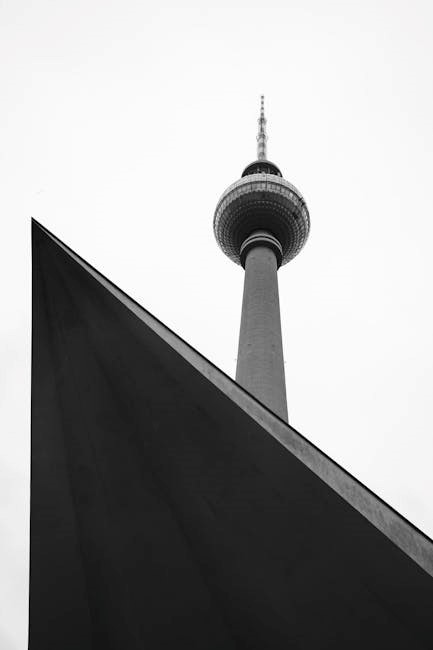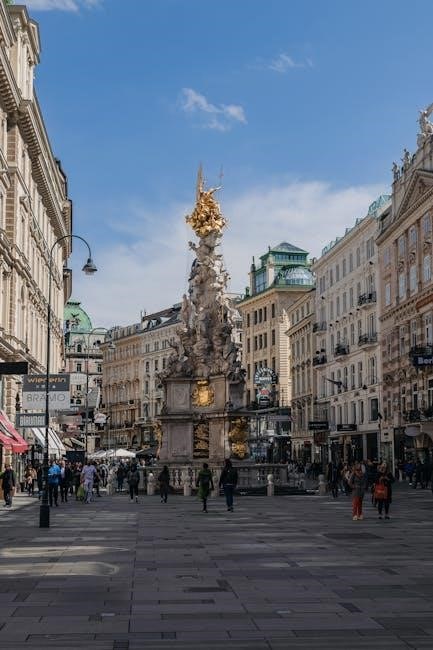Title
The Plague, written by Albert Camus, is a profound exploration of human resilience, morality, and the absurd, set against the backdrop of a devastating epidemic in Oran․
1․1 The Plague by Albert Camus: A Comprehensive Analysis
The Plague, written by Albert Camus, is a deeply philosophical novel that explores themes of absurdism, human suffering, and resilience․ Set in the fictional city of Oran, the story delves into the societal and moral implications of a devastating epidemic․ Camus masterfully weaves together the struggles of individuals, emphasizing the importance of solidarity and ethical responsibility in the face of catastrophe․ The novel’s timeless relevance is evident, as it continues to resonate with readers, offering profound insights into human nature and the search for meaning amidst chaos․
Camus’s vivid portrayal of Oran under siege by the plague serves as a microcosm for global crises, highlighting universal themes of isolation, fear, and hope․ The characters, such as Dr․ Bernard Rieux and Jean Tarrou, embody the moral and existential dilemmas faced during the outbreak․ Their journeys illustrate the human capacity for both despair and resilience, making The Plague a powerful reflection on the absurdity of life and the enduring strength of the human spirit․
The Plague by Albert Camus is a gripping narrative set in Oran, exploring human responses to suffering and the search for meaning during a catastrophic epidemic․
2․1 Historical Context and Background
Albert Camus wrote The Plague during World War II, drawing inspiration from the bubonic plague’s historical outbreaks․ The novel is set in Oran, Algeria, a city under French colonial rule, which Camus knew well․ The story reflects the absurdity of human suffering and the search for meaning during crises․ Camus’s own experiences with war and occupation deeply influenced the novel’s themes of isolation and collective resilience․ The plague serves as a metaphor for the existential challenges faced by humanity, echoing the horrors of the war and the universal struggle against adversity․ Its 2020 resurgence in popularity highlighted its timeless relevance․
2․2 The Plague as a Metaphor for Human Struggles

The Plague by Albert Camus transcends its literal meaning, serving as a powerful metaphor for human struggles․ The disease represents existential crises, societal breakdown, and the absurdity of suffering․ Camus uses the plague to explore themes of isolation, fear, and the collective response to adversity․ By depicting Oran’s descent into chaos, he reflects on humanity’s resilience and the search for meaning in a seemingly indifferent world․ The novel’s timeless appeal lies in its ability to mirror universal human experiences, making it a profound commentary on individual and societal challenges․

Major Themes in The Plague
The Plague by Albert Camus delves into existentialism, absurdism, and human solidarity․ It explores suffering, morality, and resilience, offering profound insights into the human condition during crises․
3․1 The Absurd and Existentialism
Albert Camus’ The Plague embodies the philosophy of absurdism, highlighting the conflict between humanity’s desire for meaning and the universe’s indifference․ Through Dr․ Rieux’s relentless efforts to combat the plague, Camus illustrates existentialism, emphasizing individual responsibility and moral commitment despite futility․ The novel portrays life’s inherent meaninglessness, urging readers to find purpose through action and defiance in the face of absurdity․
3․2 Solidarity and Human Resilience
The Plague underscores the power of human solidarity amidst crisis․ Characters like Dr․ Rieux and Jean Tarrou exemplify resilience, uniting the community through selfless acts․ Camus highlights how collective efforts transcend individual suffering, fostering hope․ The novel shows that even in despair, humanity’s capacity for compassion and unity prevails, offering a beacon of strength against adversity and chaos․ This theme resonates universally, reminding readers of the importance of togetherness in overcoming life’s challenges․ Through these portrayals, Camus celebrates the indomitable human spirit․
3․3 Morality and Ethics in Crisis
Morality and ethics are central themes in The Plague, as characters confront existential dilemmas amid suffering․ Father Paneloux’s sermons, blaming the plague on human sin, contrast with Dr․ Rieux’s humanist dedication to saving lives․ The novel explores moral choices, from selfishness to selflessness, revealing the complexity of human behavior in crisis․ Camus highlights the tension between religious and secular ethics, questioning divine justice while emphasizing human responsibility․ Ultimately, The Plague challenges readers to reflect on their own moral frameworks and the true meaning of ethical action in the face of adversity․

Key Characters and Their Roles
Dr․ Bernard Rieux embodies duty and compassion, leading the fight against the plague․ Jean Tarrou seeks meaning through selfless service, while Father Paneloux grapples with divine justice․ Their roles highlight resilience and solidarity in crisis․
4․1 Dr․ Bernard Rieux: The Embodiment of Duty
Dr․ Bernard Rieux is the protagonist and moral backbone of The Plague․ As a physician, he selflessly dedicates himself to combating the epidemic, exemplifying unwavering duty and compassion․ His actions are driven not by heroism but by a deep sense of responsibility to his patients and community․ Rieux’s commitment remains unshaken, even as he faces personal loss and the futility of his efforts․ His character symbolizes the human spirit’s capacity for resilience and ethical dedication in the face of overwhelming adversity, making him a timeless symbol of moral courage and duty․ His story underscores the importance of perseverance․
4․2 Jean Tarrou: The Search for Meaning
Jean Tarrou is a mysterious and introspective character in The Plague, whose journey is marked by a relentless quest for meaning and purpose․ A former political activist, Tarrou grapples with his past and the moral implications of his actions․ He finds solace in his work assisting Dr․ Rieux during the epidemic, viewing it as a form of personal redemption․ Tarrou’s character embodies the existential struggle to find significance in a seemingly indifferent world․ His death serves as a poignant reminder of the fragility of life and the enduring search for meaning in the face of suffering and absurdity․
4․3 Father Paneloux: Religious Interpretations of the Plague
Father Paneloux, a devout Jesuit priest, interprets the plague as a divine punishment for humanity’s sins․ He delivers sermons emphasizing that the plague is God’s wrath, urging the people of Oran to repent․ Paneloux’s rigid religious viewpoint contrasts with the more humanistic approach of Dr․ Rieux․ His unwavering faith is tested as the plague worsens, leading to a deeper exploration of religion’s role in crisis․ Through Paneloux, Camus examines the tension between religious dogma and human suffering, questioning the validity of attributing such tragedies to divine will․
Symbolism in The Plague
The Plague is rich in symbolism, with the disease representing suffering, injustice, and the absurdity of human existence, while Oran symbolizes societal isolation and collective struggle․
5․1 The Plague as a Symbol of Suffering and Injustice
The plague in Camus’ novel serves as a powerful metaphor for universal suffering and injustice․ It embodies the randomness and cruelty of fate, striking indiscriminately and causing immense pain․ The disease symbolizes the inherent absurdity of life, where humanity faces uncontrollable forces․ Through its relentless spread, the plague highlights societal inequalities and the collective helplessness of individuals․ Camus uses this symbol to explore existential themes, urging readers to confront suffering with resilience and solidarity rather than despair․
5․2 The Isolation of Oran: A Microcosm of Society
Oran’s isolation during the plague mirrors societal structures under stress․ The city becomes a confined world, reflecting human behavior in crisis․ Camus portrays Oran as a microcosm, where fear, solidarity, and resilience intertwine․ The quarantine reveals the true nature of its inhabitants, exposing both selfishness and altruism․ Through Oran’s isolation, Camus critiques modern society’s response to adversity, emphasizing the importance of collective action․ The city’s confinement serves as a universal metaphor for human existence, highlighting the shared struggles and moral dilemmas faced during times of crisis․

The Plague in Modern Context
The Plague resonates deeply in today’s world, particularly during the 2020 pandemic, offering timeless insights into human resilience and solidarity amid crisis․
6․1 Resurgence of Interest in 2020
The year 2020 saw a significant resurgence of interest in Albert Camus’ The Plague, as the world grappled with the COVID-19 pandemic․ Readers drew parallels between the novel’s depiction of isolation, suffering, and collective resilience in Oran and the global crisis․ The themes of solidarity, moral responsibility, and the human condition resonated deeply, making the book a relevant and comforting read․ This renewed interest highlighted the timeless relevance of Camus’ work, offering solace and insight during uncertain times․ The novel’s universal themes transcended its historical context, making it a vital resource for understanding modern crises․
6․2 Relevance to Global Pandemics
The Plague by Albert Camus offers profound insights into human behavior during crises, making it highly relevant to global pandemics․ The novel’s exploration of isolation, fear, and resilience mirrors modern experiences, such as the COVID-19 pandemic․ Camus’ depiction of solidarity and collective action highlights the importance of empathy and cooperation in overcoming adversity․ The themes of moral responsibility and societal response to suffering remain timeless, providing a framework for understanding and addressing global health crises․ The novel serves as a reminder of humanity’s capacity for both frailty and strength in the face of catastrophic events․
Resources for Readers
Download The Plague by Albert Camus in PDF from verified sources online․ The Laura Marris translation is highly recommended for its clarity and fidelity to the original text․
7․1 Where to Find The Plague by Albert Camus in PDF
The Plague by Albert Camus is widely available in PDF format from various online sources․ Readers can access it through online retailers like Amazon or Google Books, where it is often available for purchase or download․ Additionally, many academic databases and library platforms offer free or subscription-based access to the novel․ Some websites specializing in e-books also provide downloadable versions․ When searching, ensure to use trusted sources to avoid unauthorized or pirated copies․ This ensures support for the author and publisher while accessing this timeless literary masterpiece․
7․2 Recommended Translations and Editions
For readers seeking the best translations of The Plague, the Laura Marris translation is highly recommended for its clarity and faithfulness to Camus’s original intent․ Another popular choice is Stuart Gilbert’s version, known for its lyrical prose․ The 1948 edition, published during Camus’s lifetime, is also a classic option․ For scholars, annotated editions provide deeper insights into themes and historical context․ Digital versions, including PDFs, are widely available, ensuring accessibility for modern readers․ These translations and editions offer a rich reading experience, capturing the essence of Camus’s timeless masterpiece․
